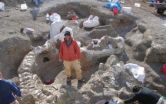(Press-News.org) Sometimes when people get upsetting news – such as a failing exam grade or a negative job review – they decide instantly to do better the next time. In other situations that are equally disappointing, the same people may feel inclined to just give up.
How can similar setbacks produce such different reactions? It may come down to how much control we feel we have over what happened, according to new research from Rutgers University-Newark.
The study, published in the journal Neuron, also finds that when these setbacks occur, the level of control we perceive may even determine which of two distinct parts of the brain will handle the crisis.
"Think of the student who failed an exam," says Jamil Bhanji, a postdoctoral fellow at Rutgers and one of the study's co-authors. "They might feel they wouldn't have failed if they had studied harder, studied differently – something under their control." That student, Bhanji says, resolves to try new study habits and work hard toward acing the next exam. Functional magnetic resonance imaging (fMRI) used in the study showed activity in a part of the brain called the ventral striatum – which has been shown to guide goals based on prior experiences.
A different student might have failed the same test, but believes it happened because the questions were unfair or the professor was mean, things that he could not control. The negative emotions produced by this uncontrollable setback may cause the student to drop the course.
Overcoming those emotions and refocusing on doing well in the class may require a more complicated thought process. In cases like this, fMRI revealed that activity in the ventromedial prefrontal cortex (vmPFC), a part of the brain that regulates emotions in more flexible ways, is necessary to promote persistence.
Mauricio Delgado, an associate professor of psychology and the study's other co-author, says people whose jobs include delivering bad news should pay attention to these results, because their actions might influence how the news is received.
"You may deliver the news to the student – no sugar coating, here's your setback," Delgado says. "But then you make an offer – 'would you like to review those study habits with me? I'd be happy to do it.' This puts the student in a situation where they may experience control and be more likely to improve the next time." This approach, says Delgado, who is on the faculty of Rutgers' Newark College of Arts and Sciences, may be far more constructive than curtly delivering a bad grade.
Bhanji says lessons from the study may even guide certain people toward giving up too soon on careers where they could do well. "We wonder why there are fewer women and minorities in the sciences, for example," he explains. "Maybe in cases like that it's fair to say there are things we can do to promote reactions to negative feedback that encourage persistence."
That is not to say everyone should persist. "There are times," Delgado adds, "when you should not be persistent with your goals. That's where the striatal system in the brain, which can be a source of more habitual responses, may be a detriment. You keep thinking 'I can do it, I can do it.' But maybe you shouldn't do it. During these times, interpreting the setback more flexibly, via the vmPFC, may be more helpful."
As research continues, adds Bhanji, important areas to explore will include "figuring out when it's worth continuing to keep trying and when it's not."
INFORMATION: END
Reacting to personal setbacks: Do you bounce back or give up?
Rutgers researchers find the ability to persist may depend on how the news is delivered
2014-09-04
ELSE PRESS RELEASES FROM THIS DATE:
Plant-based research at Penn prevents complication of hemophilia treatment in mice
2014-09-04
While healthy people have proteins in their blood called clotting factors that act quickly to plug wounds, hemophiliacs lack these proteins, making even minor bleeds difficult to stop.
The main treatment option for people with severe hemophilia is to receive regular infusions of clotting factor. But 20 to 30 percent of people who get these infusions develop antibodies, called inhibitors, against the clotting factor. Once these inhibitors develop, it can be very difficult to treat or prevent future bleeding episodes.
In a new study, researchers from the University of ...
LSU Health research discovers new therapeutic target for diabetic wound healing
2014-09-04
New Orleans, LA – Research led by scientists in Dr. Song Hong's group at LSU Health New Orleans has identified a novel family of chemical mediators that rescue the reparative functions of macrophages (a main type of mature white blood cells) impaired by diabetes, restoring their ability to resolve inflammation and heal wounds. The research is in-press and is scheduled to be published in the October 23, 2014 issue of Chemistry & Biology, a Cell Press journal.
The white blood cells, or leukocytes, of the immune system, help defend the body against infection or foreign ...
Study shows complexities of reducing HIV rates in Russia
2014-09-04
(Boston) – Results of a new study conducted in St. Petersburg, Russia, show that decreasing HIV transmission among Russian HIV-infected drinkers will require creative and innovative approaches.
While new HIV infections globally have declined, HIV rates remain high in Russia. This is due in large part to injection drug use and spread via heterosexual sex transmission. Alcohol use also has been shown to be related to risky sexual behaviors and sexually transmitted infections (STIs).
Published online in Addiction, the study showed that a behavioral intervention did not ...
AGU: Ozone pollution in India kills enough crops to feed 94 million in poverty
2014-09-04
WASHINGTON, D.C. – In one year, India's ozone pollution damaged millions of tons of the country's major crops, causing losses of more than a billion dollars and destroying enough food to feed tens of millions of people living below the poverty line.
These are findings /of a new study that looked at the agricultural effects in 2005 of high concentrations of ground-level ozone, a plant-damaging pollutant formed by emissions from vehicles, cooking stoves and other sources. Able to acquire accurate crop production data for 2005, the study's authors chose it as a year representative ...
Greener neighborhoods lead to better birth outcomes, new research shows
2014-09-04
CORVALLIS, Ore. – Mothers who live in neighborhoods with plenty of grass, trees or other green vegetation are more likely to deliver at full term and their babies are born at higher weights, compared to mothers who live in urban areas that aren't as green, a new study shows.
The findings held up even when results were adjusted for factors such as neighborhood income, exposure to air pollution, noise, and neighborhood walkability, according to researchers at Oregon State University and the University of British Columbia.
"This was a surprise," said Perry Hystad, an environmental ...
Scientists prove ground and tree salamanders have same diets
2014-09-04
Salamanders spend the vast majority of their lives below ground and surface only for short periods of time and usually only on wet nights. When they do emerge, salamanders can be spotted not only on forest floors but also up in trees and on other vegetation, often climbing as high as 8 feet. Given their infrequent appearances aboveground, it has never been clear to biologists why salamanders take time to climb vegetation. Researchers at the University of Missouri recently conducted a study testing a long-standing hypothesis that salamanders might climb vegetation for food. ...
Public trust has dwindled with rise in income inequality
2014-09-04
Trust in others and confidence in societal institutions are at their lowest point in over three decades, analyses of national survey data reveal. The findings are forthcoming in Psychological Science, a journal of the Association for Psychological Science.
"Compared to Americans in the 1970s-2000s, Americans in the last few years are less likely to say they can trust others, and are less likely to believe that institutions such as government, the press, religious organizations, schools, and large corporations are 'doing a good job,'" explains psychological scientist and ...
Researchers turn to plants to help treat hemophilia
2014-09-04
GAINESVILLE, Fla. — Accidents as minor as a slip of the knife while chopping onions can turn dangerous for patients with hemophilia, who lack the necessary proteins in their blood to stem the flow from a wound.
People with severe hemophilia typically receive regular injections of these proteins, called clotting factors, as a treatment for the disease. But up to 30 percent of people with the most common form, hemophilia A, develop antibodies that attack these lifesaving proteins, making it difficult to prevent or treat excessive bleeding.
Now, researchers from University ...
T. rex times 7: New dinosaur species is discovered in Argentina
2014-09-04
Scientists have discovered and described a new supermassive dinosaur species with the most complete skeleton ever found of its type. At 85 feet long and weighing about 65 tons in life, Dreadnoughtus schrani is the largest land animal for which a body mass can be accurately calculated.
Its skeleton is exceptionally complete, with over 70 percent of the bones, excluding the head, represented. Because all previously discovered super-massive dinosaurs are known only from relatively fragmentary remains, Dreadnoughtus offers an unprecedented window into the anatomy and biomechanics ...
INFORMS study: Customer experience matters more when economy is doing better, not worse
2014-09-04
Customer experience matters more when the economy is doing well than when it is doing poorly, according to a new study in the Articles in Advance section of Marketing Science, a journal of the Institute for Operations Research and the Management Sciences (INFORMS).
The study, entitled "Assessing the Influence of Economic and Customer Experience Factors on Service Purchase Behaviors" is by V Kumar, the Regents' Professor, Nita Umashankar, an assistant professor, and PhD candidates Hannah Kim and Yashoda Bhagwat, all at Robinson College of Business at Georgia State University. ...
LAST 30 PRESS RELEASES:
University of Ottawa Heart Institute, the University of Ottawa and McGill University launch ARCHIMEDES to advance health research in Canada
The world’s largest brain research prize awarded for groundbreaking discoveries on how we sense touch and pain
Magnetofluids help to overcome challenges in left atrial appendage occlusion
Brain-clearing cells offer clues to slowing Alzheimer’s disease progression
mRNA therapy restores fertility in genetically infertile mice
Cloaked stem cells evade immune rejection in mice, pointing to a potential universal donor cell line
Growth in telemedicine has not improved mental health care access in rural areas, study finds
Pitt scientists engineer “living eye drop” to support corneal healing
Outcomes of older adults with advanced cancer who prefer quality of life vs prolonging survival
Lower music volume levels in fitness class and perceived exercise intensity
Of crocodiles, counting and conferences
AERA announces 2026 award winners in education research
Saving two lives with one fruit drop
Photonic chips advance real-time learning in spiking neural systems
Share of migratory wild animal species with declining populations despite UN treaty protections worsens from 44% to 49% in two years; 24% face extinction, up 2%
One in 20 babies experiences physical abuse, global review finds
Tundra tongue: The science behind a very cold mistake
Targeting a dangerous gut infection
Scientists successfully harvest chickpeas from “moon dirt”
Teen aggression a warning sign for faster aging later in life
Study confirms food fortification is highly cost-effective in fighting hidden hunger across 63 countries
Special issue elevates disease ecology in marine management
A kaleidoscope of cosmic collisions: the new catalogue of gravitational signals from LIGO, Virgo and KAGRA
New catalog more than doubles the number of gravitational-wave detections made by LIGO, Virgo, and KAGRA observatories
Antifibrotic drug shows promise for premature ovarian insufficiency
Altered copper metabolism is a crucial factor in inflammatory bone diseases
Real-time imaging of microplastics in the body improves understanding of health risks
Reconstructing the world’s ant diversity in 3D
UMD entomologist helps bring the world’s ant diversity to life in 3D imagery
ESA’s Mars orbiters watch solar superstorm hit the Red Planet
[Press-News.org] Reacting to personal setbacks: Do you bounce back or give up?Rutgers researchers find the ability to persist may depend on how the news is delivered



